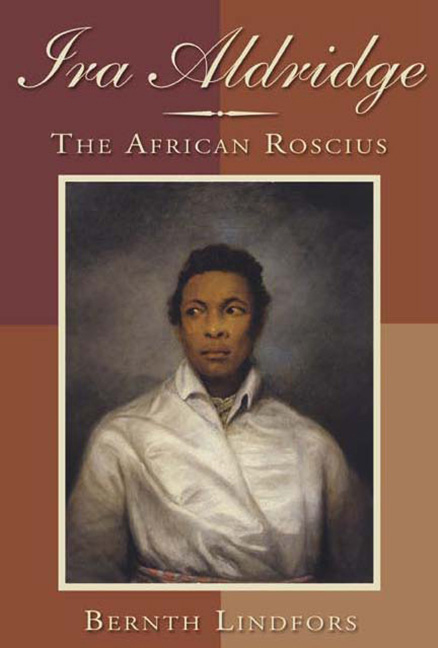Book contents
- Frontmatter
- Miscellaneous Frontmatter
- Contents
- List of Illustrations
- Acknowledgments
- Introduction
- Part One: The Life
- Part Two: The Career
- 8 Ira Aldridge's Fight for Equality
- 9 Ira Aldridge in Manchester
- 10 Acting Black: Othello, Othello Burlesques, and the Performance of Blackness
- 11 Ira Aldridge: Shakespeare and Minstrelsy
- 12 “Mislike me not for my complexion … “: Ira Aldridge in Whiteface
- 13 Ira Aldridge as Macbeth and King Lear
- 14 Creating the Black Hero: Ira Aldridge's The Black Doctor
- 15 The First American on the Zagreb Stage
- 16 A Heartwarming, Radiant Othello in the Netherlands, 1855
- 17 Ira Aldridge's Performances in Meiningen
- 18 “Othello's Occupation's Gone!” The African Roscius in Poland, 1853–67
- Notes on Contributors
- Index
- Miscellaneous Endmatter
18 - “Othello's Occupation's Gone!” The African Roscius in Poland, 1853–67
from Part Two: The Career
Published online by Cambridge University Press: 26 October 2017
- Frontmatter
- Miscellaneous Frontmatter
- Contents
- List of Illustrations
- Acknowledgments
- Introduction
- Part One: The Life
- Part Two: The Career
- 8 Ira Aldridge's Fight for Equality
- 9 Ira Aldridge in Manchester
- 10 Acting Black: Othello, Othello Burlesques, and the Performance of Blackness
- 11 Ira Aldridge: Shakespeare and Minstrelsy
- 12 “Mislike me not for my complexion … “: Ira Aldridge in Whiteface
- 13 Ira Aldridge as Macbeth and King Lear
- 14 Creating the Black Hero: Ira Aldridge's The Black Doctor
- 15 The First American on the Zagreb Stage
- 16 A Heartwarming, Radiant Othello in the Netherlands, 1855
- 17 Ira Aldridge's Performances in Meiningen
- 18 “Othello's Occupation's Gone!” The African Roscius in Poland, 1853–67
- Notes on Contributors
- Index
- Miscellaneous Endmatter
Summary
An official statement of the chief of police in the city of Łódź, dated August 7, 1867, carried the following message: “I have the honor to inform the Court that at 5 p.m. today an American citizen, actor Ira Aldridge died of illness in the house of Michał Kunkiel in the ‘Paradyz.’ “ The sudden death of the world-famous Negro actor caused a sensation that turned the burial ceremony into a great spectacle. A detailed report of this event was given several days later by all newspapers of renown throughout Poland. One of the Warsaw dailies, Kurier Warszawski, wrote:
On 9 August the body of Ira Aldridge, a Negro dramatic artist who died several days before, was buried in the Evangelical Cemetery in Łódź. His body had been earlier displayed in one of the ground floor rooms of Hentschel's hotel, in which he parted with his life. The room was beautifully decorated and turned into a chapel. The features of the artist did not change much after his death. On the day before the funeral the local singing society comprised of more than one hundred people sang a mourning hymn, while on the day of the funeral, after the hymn was sung again, Father Ronthaler said the prayers. The funeral procession consisted of a military orchestra, which performed Haydn's Oratorium, the singing society, the orchestra of a shooting society and the society of dramatic artists under the direction of Mr. Hentschel. On a cushion in front of the casket lay medals which the late actor had received, as well as a laurel wreath. The caravan was followed by the President of the city of Łódź, the shooting society in uniforms, representatives of the city guilds with banners, and a carriage in which the widow rode. At the gravesite Father Ronthaler delivered a speech for the numerous citizens who participated.
At the time Rev. Ronthaler was saying his prayer, some of the assembled citizens were already spreading gossip about the “mysterious death” of the Negro actor. According to some, he was poisoned; others claimed he had been killed in a fight with a waiter at a restaurant where he allegedly had offended a waitress. The most popular version, though still hearsay, spoke of a police conspiracy to murder Aldridge—a spy and participant in the revolutionary movement of contemporary Europe.
- Type
- Chapter
- Information
- Ira AldridgeThe African Roscius, pp. 243 - 266Publisher: Boydell & BrewerPrint publication year: 2007



